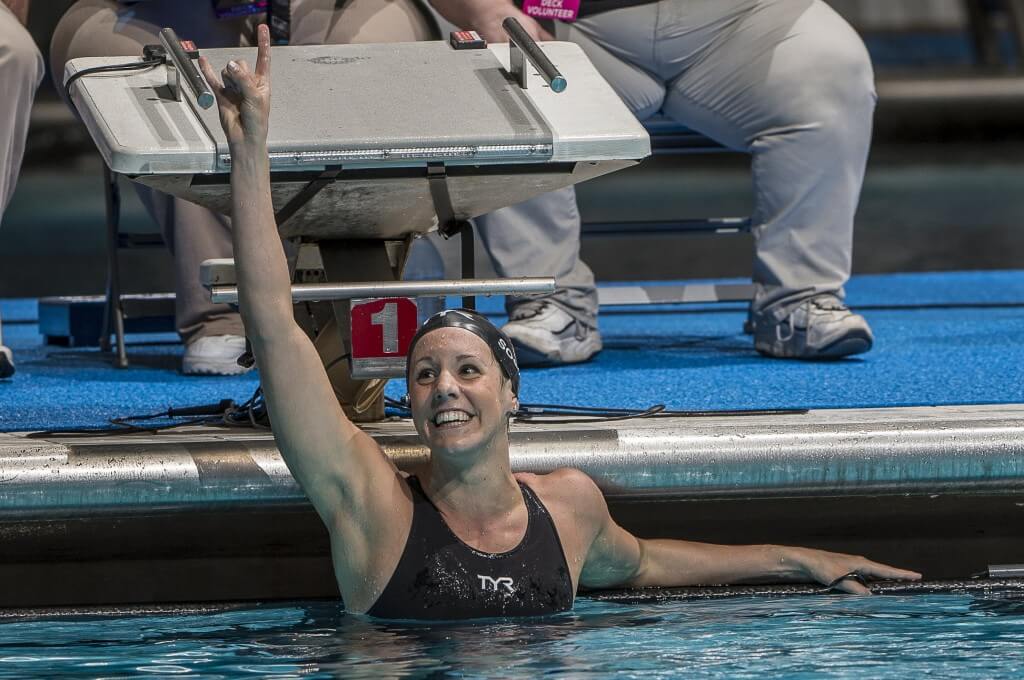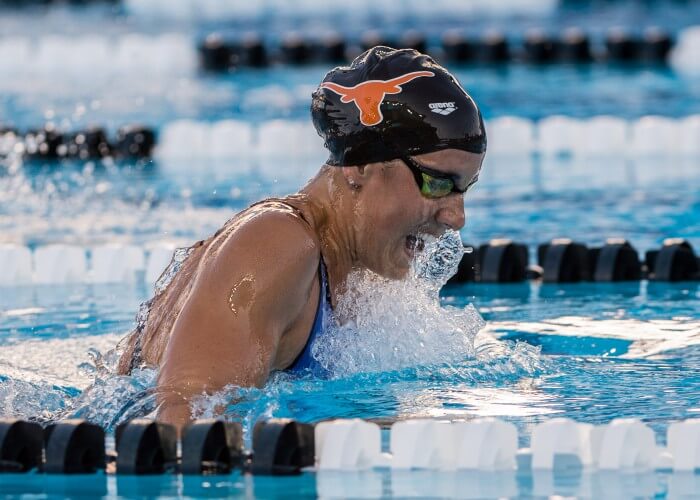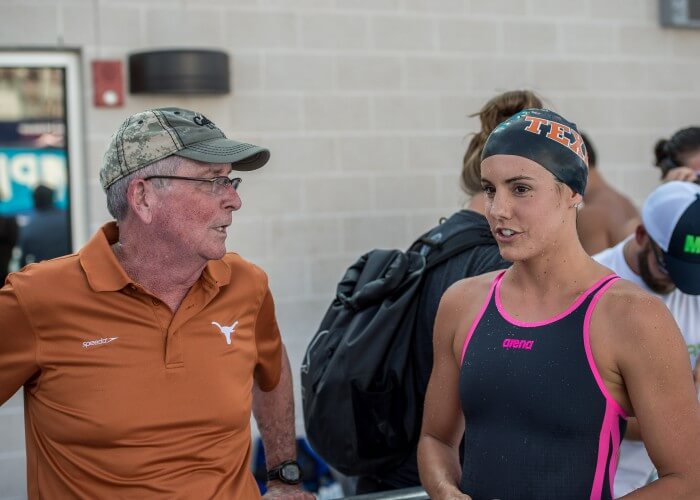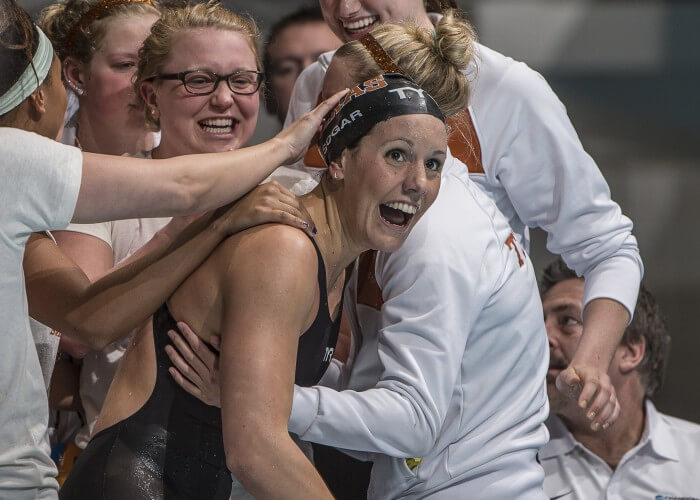Keeping Up With The Longhorns: Olympic Hopeful Laura Sogar

By Remedy Rule, Swimming World College Intern
As the days left until Olympic Trials dwindle down, the emotions and hype surrounding the meet intensify. Taper begins. Fine tuning of technique comes to a close. How are the top ranking seeds preparing for the meet?
National Teamer Laura Sogar gives us some insight on her training leading up to Olympic Trials.
Q&A with Laura Sogar

Photo Courtesy: Peter Bick
Swimming World: What events will you swim at Trials?
Laura Sogar: In the past I’ve done the 200 IM, 100 and 200 breaststroke, but I think this time I’m just doing the 100 and 200 breaststroke.
SW: Earlier this year you began training with Eddie Reese and the Texas Men, what prompted that switch?
LS: I’ve been at Texas for a really long time – seven years – which is nuts. I’ve done four years with Carol (Capitani), which has been wonderful and I have been lucky to have the input of Eddie throughout that time. Earlier this year I decided to begin training with the men’s breaststroke group to take advantage of the great culture and race environment it provided.
I’m lucky enough to be at the University of Texas where there are two incredible programs working side by side. I’m polishing off the last little bit (before Trials) with one of the greatest coaches in the world after many years of learning and training with another one of the greatest coaches in the world. It’s a pretty unique experience and the lessons I’ve taken away from both programs will help me be my best in Omaha.

Photo Courtesy: Peter H. Bick
SW: How has competing at the international level (Duel in the Pool, World University Games) prepared you for Olympic Trials?
LS: No matter where you go in the world, pools are pools. There may be slight variations like people swimming clockwise versus counterclockwise, but the nice thing about swimming is its universality. Everyone is just trying to get across the pool as fast as they can. Whether you’re here, Kazan, or Rio, you should always be doing your best for your team and for yourself. Having those experiences and knowing it’s just swimming has been calming. I would love the opportunity to do a little bit more!
SW: How has your approach changed from your first Olympic Trials in 2008 to this upcoming one?
LS: Oh man, 2008 was wild because I was just 17. I was really lucky I came from Bluefish. We had a large, very talented team going to the meet but none of us had experienced Olympic Trials before. We didn’t know what to expect. This time, I know the general atmosphere. Everyone’s emotions are very raw and this pressure-filled environment can be quite intimidating; it’s easy to get swept up in.
I’ve grown a lot since my first Trials. The biggest thing I’ve learned is that swimming is much more than what happens in the pool. The relationships and leadership skills you develop on teams, mental toughness you rely on when facing hard sets or big losses, and belief in your ability to overcome all odds are the real takeaways from the sport. Swimming fast is just a byproduct.
Once you get to the meet, it’s just showcasing all the hard work you’ve already done. Those lessons are the things I’ll take into Trials this year. If I make finals or go a best time, it’s the cherry on this already beautiful sundae I’ve created with lessons and skills that will continue to enrich my life.

Photo Courtesy: Peter H. Bick
SW: Is there a specific lesson you’d like to share?
LS: My first year out of college (2014) I swam really slow; I had to reevaluate my goals and ask why I was in the sport with brutal honesty. I remember asking myself, “Why am I swimming, what is the point of all this?” I did some soul-searching and realized the full impact and extent of the sport. I love swimming because it reflects where your life is: your relationships with people, your mental toughness, and the hard work you’ve willed yourself to put in. I knew that if I wanted to swim fast again I would need to become a balanced, healthy, happy person who didn’t hold her whole identity in the sport.
This took a lot of hard work and I had to support myself financially to continue chasing my dream. I started working full-time at a local start-up which helped me gain confidence in my value outside of the pool. I began improvisational comedy classes so that I would have a fun, fulfilling hobby to distract myself from work and the pool. I began planning more seriously for my future outside of swimming. And I re-prioritized relationships with close friends who wanted me to be happy.
My schedule was hectic – I was stressed balancing it all, but I was much happier and was able to tackle the following year with a new perspective, taking all the challenges presented to me as opportunities to learn. If I could go back in time and make myself swim faster in 2014, I wouldn’t. That hard dose of reality made me grow much more as a person than any success would have and I am happy with who it made me become.
SW: What did winning the 200 breaststroke at 2015 Phillips 66 Nationals do for you?
LS: It’s a big confidence boost going into Trials and it reassured me that the soul-searching I had done was fruitful. The way I am looking at swimming now is a lot healthier than it had been in 2014. It was really cool to see it come all together and feel, “Oh yeah, I was right, I knew I could do it.” This year I have taken a leave of absence from work so that I can allow for a better training environment leading into Trials, but I have not forgotten the lessons I have learned.



